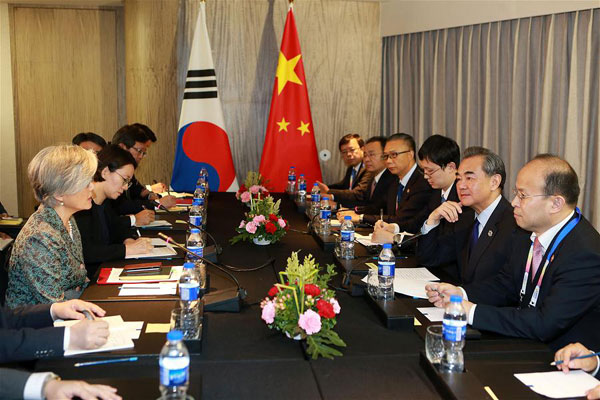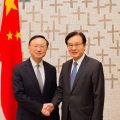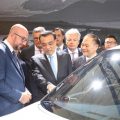
MANILA — China urges South Korea to stop further deployment of the US Terminal High Altitude Area Defense (THAAD) and make efforts to improve their relations by removing the stumbling block between them, Chinese Foreign Minister Wang Yi said in Manila Sunday.
Wang made the remarks while meeting with his South Korean counterpart on the sidelines of a series of ASEAN foreign ministers’ meetings in Manila.
Wang said that it is very important to maintain communications between China and South Korea as they are neighbors and relevant parties to the Korean Peninsula issue.
He mentioned that South Korean President Moon Jae-in expressed his willingness to take care of each other’s rightful concerns and try his best to improve the two countries’ relationship after he took office.
However, Moon’s hasty order of further deployment of the THAAD missile interception system recently has cooled down the momentum of the improvement of bilateral relations, Wang pointed out.
Wang said the deployment of THAAD goes beyond the defense need of South Korea and damages China’s strategic security interest, which is neither the way that neighboring countries get along with nor the principle that strategic partners should follow.
China hopes the South Korean government could realize the essence of the problem right now and the damage THAAD brings to South Korea and make wise decisions in line with fundamental interests of South Korea.
South Korean Foreign Minister Kang Kyung-wha recalled that leaders of South Korea and China met last month at the G20 summit in Berlin and made important consensus on improving the two countries’ relationship, adding South Korea also hopes to solve existent problems in their relations and promote substantive improvement.
The two ministers exchanged views on the current situation in Korean Peninsula during their meeting.
Wang hopes all relevant parties should weigh the pros and cons cautiously and refrain from activities that could escalate tensions and create conditions for early resumption of peace talks.
He hopes South Korea could consider China’s “double suspension” proposal on the Korean Peninsula carefully, which refers to suspension of missile and nuclear tests by the Democratic People’s Republic of Korea (DPRK) and of joint military drills by the United States and South Korea.


